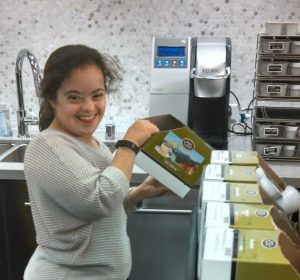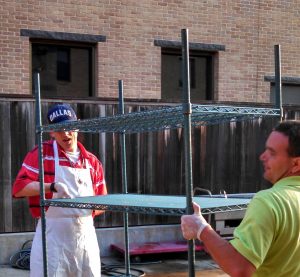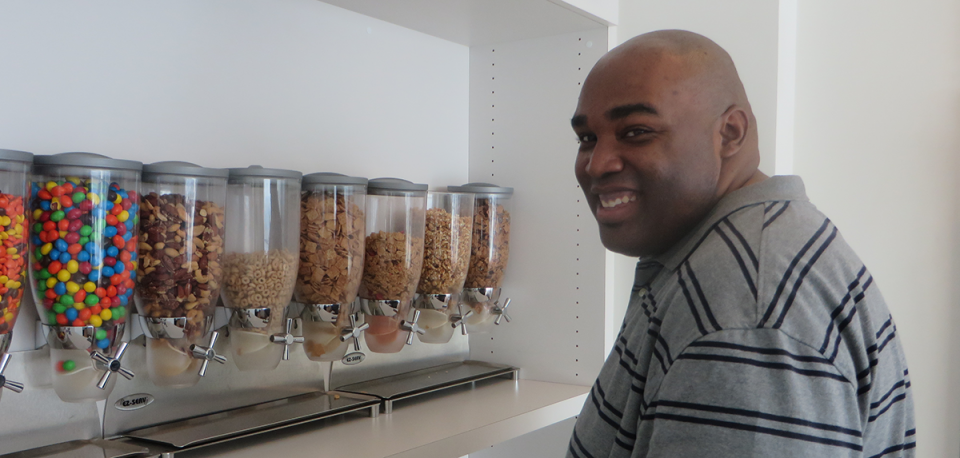Opportunities and options for special needs or disabled young adults after high school
By Karyn Brodsky
Choosing a path after high school can be overwhelming; finding the right path for a differently-abled student can be downright challenging. Thankfully, more vocational and transitional programs are popping up in Texas and the rest of the country that focus on the next steps for those who have special needs.
Plano, TX-based LaunchAbility focuses primarily on vocational placement. The organization matches young adults with special needs to a job that best suits their talents and desires. The process begins with a Person Centered Transition Assessment (PCTA) to measure individual abilities and strengths, while managing expectations. “It’s like an Individualized Education Program (IEP) for the student’s future. We bring together the PCTA team, which includes the student and their support system, which may be parents, teachers, therapists and/or siblings,” explains Anne Hudson, Director of Disability Hiring. “Together, we create an action plan, dissecting their strengths and weaknesses, what they want to do in life and how they’re going to get there.” The results of the PCTA generate the young adult’s profile based on their interests with an eye toward limitations.
The next phase is job development, when LaunchAbility representatives reach out to the community to see which companies are open to the program and how to create an employment relationship. The final step is job coaching. The coach works side by side with the employee at the position until he or she can function independently – even as long as eight weeks – and coaching is offered for the lifetime of that employment. “We track how the employee is doing and how the relationship is progressing,” explains Hudson.

Cheryl Siple of Dallas is familiar with LaunchAbility’s program and how successful it was for her 20-year-old son Will. After he graduated from Dallas Academy, a private school for students with learning disabilities, Cheryl wasn’t certain what Will’s path would be as the school did not have the resources to offer transition services. Will wanted to try college because he saw his older brother attend. Cheryl says he took two classes at a community college, but it wasn’t for him.
When Cheryl found out about LaunchAbility, she and Will participated in a PCTA; Will engaged in mock interviews with LaunchAbility staff, and then the job search began. “I love how LaunchAbility does it,” she says. “They set up three different ‘try outs’ with three different employers.” Will spent ½ day each working in a movie theater, a restaurant and a Lowe’s Home Improvement store. A LaunchAbility mentor accompanied him to each place of employment and observed. Will liked the job at Lowe’s the most, and he and the LaunchAbility job coach attended an interview. Cheryl says Will got the job offer and has now been at Lowe’s for about six months. “He did better than I thought he would at all the jobs,” Cheryl says. “I’m happy with the outcome, but more importantly, Will is happy and that’s what matters.”
Cheryl also adds that she was able to get financial assistance for Will’s LaunchAbility support through the former Texas Department of Assistive and Rehabilitative Services (DARS) whose services have been transferred to the Texas Workforce Commission (TWC). (twc.state.tx.us)
“It’s never too early to start planning, and the earlier the parents start doing the research and exploring options, the better,” explains Hudson. “Parents need to not be afraid to let go, as the process is smoother if they and their children are socially and emotionally prepared, as well as prepared for the workforce.”
Hudson says LaunchAbility has an impressive success rate. After placing hundreds of clients from Dallas, Collin, Denton, Kaufman and Tarrant counties, 88% of their current clients have worked at their jobs for more than one year, 49% for more than five years and 30% for more than 10 years.
If a differently-abled young adult desires to obtain a post-secondary education, a transition program may be the way to go. Beth McGaw, owner of the recently “launched” LaunchPad Consulting Group in Plano (and also a LaunchAbility volunteer), says her organization offers coordinating services for students attending community college. A coach helps the young adult manage time and deadlines to keep him or her on track while enrolled. “Often times, that’s when they fail, because there’s no one there to offer support,” says McGaw.
LaunchPad also assists those individuals who already have a degree and are in the workforce, but who find that the position is not working for them. LaunchPad helps recreate resumes, works on interview skills and helps people find the job that is the right fit. “Many of these students have learning disabilities or Attention Deficit Hyperactivity Disorder (ADHD) and don’t want to disclose their disability to their employer but must find the right fit in order to succeed,” explains McGaw.
Some differently-abled young adults choose to attend community college. At Austin Community College (ACC) in Austin, TX, the school offers a Skills, Training and Education for Personal Success (STEPS) program, which “provides a path for students with mild to moderate disabilities to cultivate skills for a successful future. By valuing each student’s unique abilities and developing their individual potential, we provide educational enrichment and the skills for meaningful employment.” (continue.austincc.edu/steps)
 Program Coordinator Mariah Lossing says STEPS is meaningful and gives individual training for intellectually disabled adults to help prepare them for ACC credit courses or a vocation. “This program was born out of community necessity because once young adults hit 22 years old and age out of high school transition programs, there is not much out there for them,” she explains. Lossing notes that some students want certification classes (ACC offers over 200), as they know that income increases with certification and about 10% want to take the admissions test for ACC credit classes. “We meet with each student to assess their likes, goals and dreams and determine what’s best for them individually,” Lossing says. She adds that the STEPS program accepts students ages 18 and up. There is no age cap, and some students are in their 30s, 40s and 50s.
Program Coordinator Mariah Lossing says STEPS is meaningful and gives individual training for intellectually disabled adults to help prepare them for ACC credit courses or a vocation. “This program was born out of community necessity because once young adults hit 22 years old and age out of high school transition programs, there is not much out there for them,” she explains. Lossing notes that some students want certification classes (ACC offers over 200), as they know that income increases with certification and about 10% want to take the admissions test for ACC credit classes. “We meet with each student to assess their likes, goals and dreams and determine what’s best for them individually,” Lossing says. She adds that the STEPS program accepts students ages 18 and up. There is no age cap, and some students are in their 30s, 40s and 50s.
“Most students are not ready for a four-year college, so we provide a bridge,” says Lossing. “They are considered ACC students and can participate in activities but with a little help.” Lossing says classes are small – no more than eight students – and all STEPS instructors are special education certified and act as mentors and facilitators. Returning students also help new ones as they learn classroom and social skills. Fifteen classes were taught on four ACC campuses this semester, and next semester there will be twice as many. STEPS will partner with Arc of the Arts, a daily arts education program for people with intellectual and developmental disabilities and other community members provided by The Arc of the Capital Area. In conjunction with Texas Rowing for All (TRA), STEPS also offers rowing classes. “We just bought a new boat, so those in wheelchairs can participate,” beams Lossing.
Though moving on from high school can be daunting, these programs show that there is a place for everyone.
For information on My Possibilities and LaunchAbility, click here.


